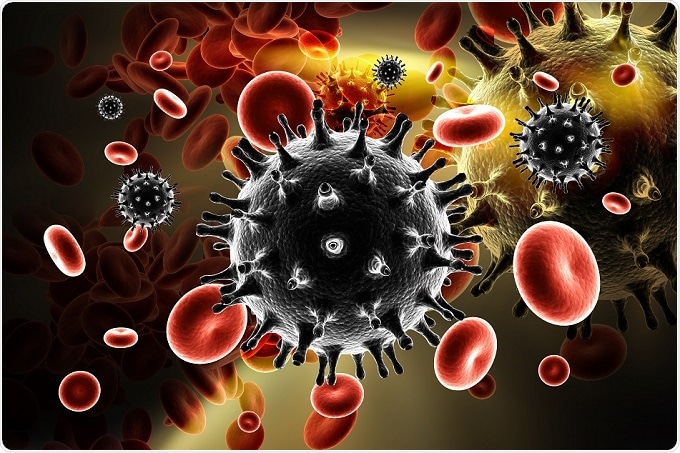Scientists from the National Institutes of Health (NIH) in collaboration with the pharmaceutical company Sanofi have engineered a three-pronged antibody that protected monkeys from two strains of Human Immunodeficiency Virus (HIV) better than the equivalent naturally occurring antibodies.
 Credit: RAJ CREATIONZS/Shutterstock.com
Credit: RAJ CREATIONZS/Shutterstock.com
HIV is the causal agent of acquired immunodeficiency syndrome (AIDS). It infects vital immunity-providing cells causing progressive failure of the immune system. As a consequence of their compromised immune system, patients with HIV are particularly vulnerable to opportunistic infections and cancers.
For several decades, a key research goal has been to develop an effective AIDS vaccine. However, the high level of genetic diversity of HIV has made the generation of broadly neutralizing antibodies particularly challenging. A three-pronged antibody has now been engineered that has specificity for three independent HIV antigens. It binds to three different critical sites on HIV.
The single antibody with triple action afforded monkeys better protection against infection with two strains of monkey HIV than the individual natural antibodies from which the engineered antibody was derived.
Twenty-four monkeys were vaccinated against HIV; eight with one of the natural antibodies, eight with the second naturally occurring antibody and eight with the engineered tri-specific antibody. Five days later, all monkeys were injected with two strains of monkey HIV. Although more than half of the monkeys in each of the natural antibody groups became infected with HIV, none of the monkeys who received the engineered three-pronged antibody became infected.
The engineered tri-species antibody also prevented infection by more different HIV strains in cell cultures and with greater potency than natural, single-specificity antibodies.
Dr Anthony S. Fauci, director of the National Institute of Allergy and Infectious Diseases (NIAID), commented "Combinations of antibodies that each bind to a distinct site on HIV may best overcome the defences of the virus in the effort to achieve effective antibody-based treatment and prevention...The concept of having a single antibody that binds to three unique sites on HIV is certainly an intriguing approach for investigators to pursue".
Clinical trials to test the new broadly neutralizing tri-specific antibody in healthy people and in people living with HIV are due to start in 2018.
The partnership between NIAID and Sanofi has been invaluable and allows us to move this tri-specific antibody from the lab and preclinical testing into the clinic"
Dr John R Mascola, director of the NIAID Vaccine Research Center.
The simultaneous binding of three independent antigens by a single antibody has the potential to significantly increase the power of vaccinations. If the clinical trials in HIV prove successful, the technology could be used against a wide range of other infectious diseases, autoimmune diseases and cancers.
Sources:
- L Xu et al. Trispecific broadly neutralizing HIV antibodies mediate potent SHIV protection in macaques. Science 2017; Vol 357. Available at http://science.sciencemag.org/content/early/2017/09/19/science.aan8630
- National Institute of Allergy and Infectious Diseases. Press Release 20 September 2017. Available at https://www.eurekalert.org/pub_releases/2017-09/nioa-tap091817.php